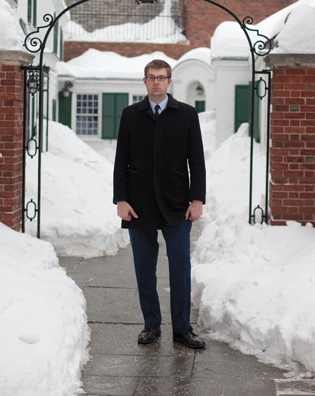 loading
loading
Light & VerityA return to ROTC? Julie BrownJohn Swisher ’11 is one of a handful of Yale students who travel to other campuses to participate in ROTC. View full image
A January snowstorm canceled John Swisher's usual Thursday afternoon drive to eastern Connecticut for Air Force ROTC training. The Yale senior hopes future cadets might be spared the trek by a more lasting change in the climate—the political and cultural climate. Relations between Yale and the military's Reserve Officer Training Corps have been frozen for four decades. Now, Yale officials are working "enthusiastically" toward a thaw, says Yale College dean Mary Miller '81PhD. But the forecast for ROTC's return to the campus remains uncertain. On college campuses across the country, ROTC pays college tuition for students who enroll in officer training and agree to serve in the military after graduation. The Army and Navy ended their programs at Yale in 1970, when the faculty—at the height of the Vietnam era—proposed new academic rules that the military was unlikely to meet. (ROTC also left Harvard and several other elite colleges under similar circumstances.) Since then, Yale undergraduates who want to participate have had to travel to the University of Connecticut or, for Army ROTC, to the University of New Haven. Yale pays for the rental cars and is "nothing but accommodating," in Swisher's words. Still, the university has just four ROTC cadets this year, says William Whobrey, an assistant dean and administrative liaison to those students. Sporadic efforts to bring back ROTC gained steam in December, after Congress repealed the military's "don't ask, don't tell" policy. "Yale is eager to open discussions about expanding opportunities for students interested in military service," said President Richard Levin '74PhD in a statement on December 21, three days after the repeal vote. He asked three high-ranking administrators—Miller, university secretary Linda Koch Lorimer '77JD, and general counsel Dorothy Robinson—to "consult with officials in Washington," adding: "We are very hopeful that these discussions will enable us to begin a new chapter in the long history of Yale's support of the U.S. Armed Services." Soon afterward, Levin called defense secretary Robert Gates "to underscore Yale's interest" in reviving ROTC. But obstacles remain. For one, nobody knows whether Yale could attract enough student interest to support a program. "Ideally, the military would aspire to a detachment that would have as many as 15 students entering per year," says Miller. Funding is another issue: at a time of defense cutbacks, launching a small new ROTC unit might not be a priority for the government. Moreover, Yale faculty would need to approve any for-credit military courses, and academic quality has been a sticking point in the past. "At this point, we are in a really energetic data-gathering phase," Miller says. Military officials "want a lot of concrete information from us." And Yale wants to know "how ROTC unfolds at institutions that we think of as very much like Yale," such as Princeton and the Massachusetts Institute of Technology. An on-campus military unit would be healthy for the university, says Swisher. "Yale has always been very good at accepting people who have a wide range of interests," he says. But during his freshman year, "a friend in uniform was walking to the car, and a group of people walked up to him and asked him if he was in a play." Bringing back ROTC "would add to the diversity."
The comment period has expired.
|
|